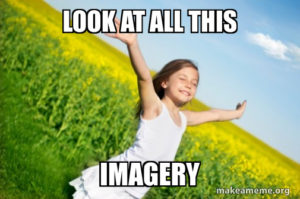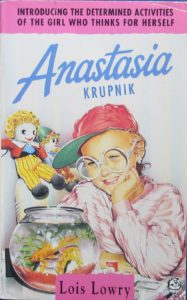When I studied creative writing at Queens we were visited by my favourite writer, Marilynne Robinson, who also teaches at the Iowa University’s Writers Workshop. The IWW have produced 17 Pulitzer Prize winners and 6 recent US Poet Laureates, among many other honours.

Robinson said she is asked by every university she visits, “What’s the IWW’s secret, why are you so successful?” And she always answers, “We don’t grade.” And, without exception, their faces fall.
They hate that response. Because schools are under pressure to show results, especially in arts subjects, where there’s a sense that we must prove we’re ‘as good’ as STEM subjects by producing evidence of learning. Grades are a convenient way to do this. Even writing courses often include some academic writing to accompany your creative piece, as if to show you’re not just scribbling stories, you’ve done some ‘proper’ work too.
The IWW students spend a year just writing and critiquing each other’s work. The staff encourage, support, advise, but they don’t ‘teach’, they don’t give assignments, and they don’t grade.
17 Pulitzer Prizes. 6 Poet Laureates.
I’m thinking they’re onto something.

I recently reviewed Kate Clanchy’s inspiring book, ‘Some Kids I Taught and What They Taught Me’, about her teaching career in some of the more ‘difficult’ schools in England. She notes in the book that teaching is one of those professions that everyone feels qualified to tell you how to do. I’m not a teacher (or a librarian) and I’m very aware that I’ve set up a blog to give advice to teachers and librarians, so I was reassured to find that such an experienced and gifted teacher as Kate Clanchy is also ranting about the school curriculum.
She points out that in other artistic fields we start by learning the skill, then we learn to analyse it. We begin by learning to play an instrument or draw a picture, then as we go through school, we learn to study our own technique and then to analyse music and art. But the English curriculum doesn’t usually include the practice of writing fiction and poetry, just of analysing it.

“Only a couple of syllabuses allow for even the smallest amount of creative response – or any kind of creative writing – to be shoehorned in by dedicated teachers.”
She suggests this is because everything that goes on in a classroom has to fall under specific learning objectives that can be built on. But how do you specify what has been learned by a student writing a poem? – Spelling? Rhyme? Empathy? Learning objectives don’t apply in the arts, where exposure to a piece of writing might teach you the difference between a noun and a verb, or it might alter your worldview forever.

In her writing group she reads the kids a poem each week, then lets them write whatever they like. She says most of them don’t have the vocabulary to analyse the poem academically, and would lose interest if she made them do that. But they often respond to the poems and write their own versions.
“The poem had been written, entirely in front of me, in less than an hour. Michael had chatted for at least 20 minutes of that; giggled to himself through most of the composition process; …. I could not have hoped for a more powerful or accomplished literary reply if I’d lectured my MA students for an hour and set the task as coursework. But no lecturing had happened at all. No one mentioned iambs, or stereotypes, or subversion or even gender. All we did, in our group of teenagers sitting round in the library – all I ever do, in fact – was read the poem, and chat, not about how the poem worked, but about what it provoked in us.”
In our capitalist economy, all assessments really mean is – will this make money? Is my knowledge of physics good enough to earn me a salary?
“The position firmly in place now in England… is that our schools should focus their attention on producing units of sellable labour power (school leavers).” – Michael Rosen
That’s depressing enough if physics is your passion but at least it’s relevant, given that a high degree of accuracy will be part of your physics job.
But does good/bad, right/wrong relate to writing? Yes, if you want to publish. But kids aren’t writing because they want to get published. Kids write to explore their inner landscape, experiment with language and ideas and vent their feelings. And what are we saying? Your feelings are a solid B but not good enough for an A? Your sonnet about your dying grandfather needs better iambic pentameter?
I still vividly remember Anastasia Krupnik’s teacher giving her poem about sea creatures an ‘F’ because she hadn’t used capital letters or rhyme and the words were all over the page (like sea creatures). I remember it because the phrase ‘here in the whisperwarm wet’ has stayed with me for over 30 years, my 9 year old self thought it was such a beautiful poem.

Anastasia lifted her head and looked Mrs Westvessel in the eye. “I worked very, very hard on that poem,” she said, in a loud, clear voice.
Mrs Westvessel looked terribly sad. “I can tell that you did, Anastasia,” she said. “But the trouble is that you didn’t listen to the instructions. I gave very, very careful instructions to the class about the kid of poems you were to write.”
At home, that evening, Anastasia got her green notebook out of her desk drawer. Solemnly, under “these are the most important things that happened the year that I was ten,” in item three, she crossed out the word wonderful and replaced it with the word terrible.
“I wrote a terrible poem,” she read sadly.
I recommend Clanchy’s book and Rosen’s articles (and Anastasia Krupnik!) if you’re interested, but all I wanted to say here was, when you find yourself wondering how valuable writing Warrior Cats Fan Fiction really is to your young writers, or you suspect you should probably make them publish a booklet so everyone can see on Open Night how productive they are, just remember that you’re providing something that the whole rest of the curriculum doesn’t. You may be the last bastion of creative freedom in their education, and the results of your efforts may be intangible, ineffable, indefinable, but you have to have faith that you are making a difference.
